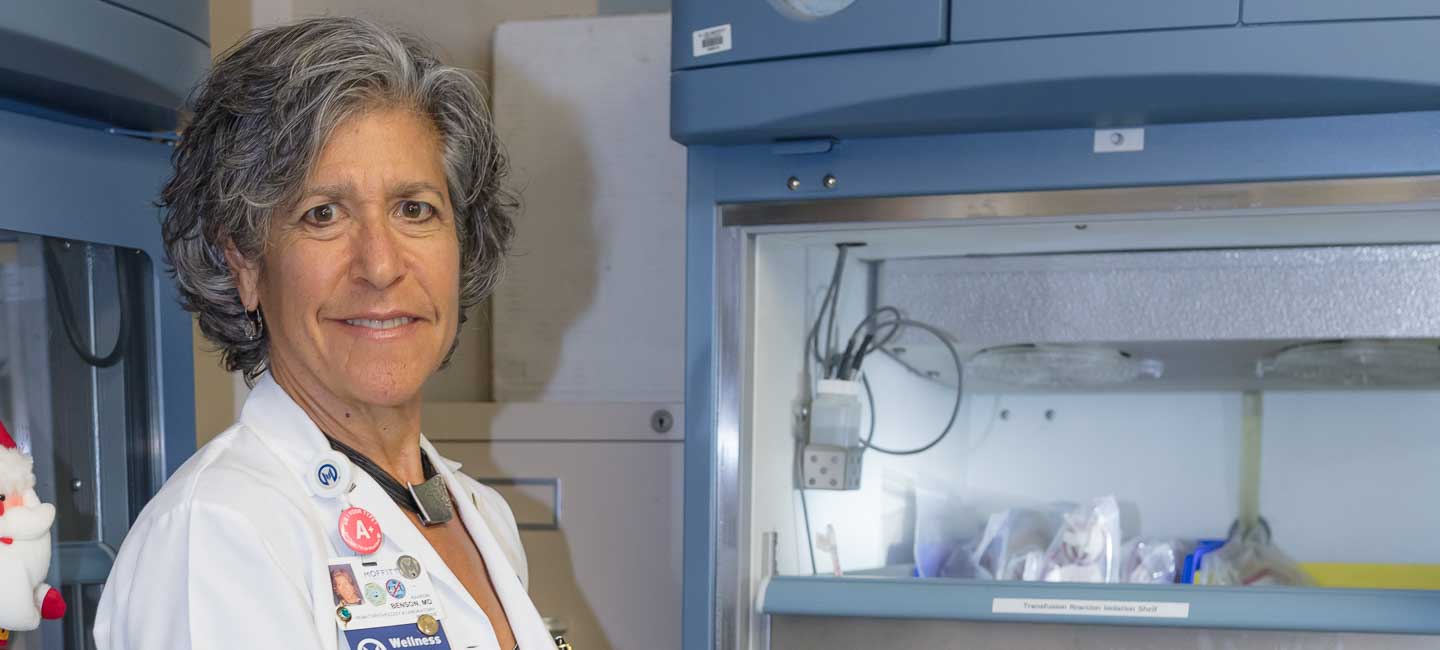What Is Transfusion Medicine?
Spend time with Kaaron Benson, MD, and you will learn a little about pathology.
Spend a little more time, and you will learn how the complexities of transfusion medicine tie in with quality patient care. Delve further and you will meet a passionate patient-focused doctor, teacher, mother, energetic cyclist for a cause and a warm, sociable strong woman. Photos of her daughters and friends, along with memorabilia from her travels, grace her office walls and credenza.
Quality patient care, delivered through her expertise in transfusion medicine, is a key component to her professional life. "Transfusion medicine is a broader-based field than it appears at first glance," says Benson. She should know, having served a fellowship in Transfusion Medicine at the American Red Cross Blood Services in Los Angeles, where she later became assistant medical director. And since 1989, Benson, a pathologist, has been with Moffitt where she directs the cancer center’s blood bank.
The field of blood banking increasingly is referred to as transfusion medicine, because the work extends beyond storing units of blood products in refrigeration and performing cross matches. The all-encompassing work of transfusion as a practice is akin to personalized medicine, making sure that the right blood is available at the right time for the right patient.
“Some might think of blood transfusions as being primarily needed for accidents, but there is so much more,” says Benson. The intricacies of making sure patients get the right blood they need is essential for patients like Steve Barber, who had developed antibodies over the course of having received multiple transfusions.
Moffitt performs more than disease testing and screening for ABO, RH and other antibodies, notes Benson. Cytomegalovirus (CMV) testing is performed because the immune systems of cancer patients frequently are compromised and CMV-negative patients may be at particular risk. “We also routinely provide irradiated blood,” says Benson. “This way our physicians do not have to think about specially ordering irradiated blood.” This is a win, she notes, because it is a lifesaver for certain patients who require it, and the irradiated product causes no harm to those not needing it.
Irradiation prevents donor T cells in blood and blood products from proliferating. Otherwise, those cells could mount an attack against the patient’s immune system. “Irradiation of blood products is not necessary for every blood recipient,” says Benson. “People with healthy immune systems can easily fight off the small number of donor T cells. But for a patient with leukemia, for example, even a small number of blood donor T cells present in the transfused blood could create a lethal event.” The irradiated blood helps to keep these particular patients safe.
Benson is serious about her complex work, which she clearly enjoys. But her passions extend far beyond the blood bank.
“Unlike most pathologists, I don’t have a microscope and I don’t do autopsies; I see patients. And when I don’t see patients, I do a lot of patient consultation with patients who need specialized units of blood or other services. It is very satisfying that I have direct patient interaction and involvement in the patients’ clinical care,” says Benson. “And the thing that attracted me most to my position here at Moffitt was being able to teach. I very much enjoy all the teaching opportunities I have – with the medical students, and the pathology residents, the hematology oncology fellows. Also students in the USF physician assistant and nursing programs. So I always welcome those opportunities.”
When Benson isn’t tending to the transfusion needs of patients or teaching the next generation of medical doctors or medical team members, you might find her riding her bicycle around her South Tampa neighborhood as she warms up for the next Moffitt Day. Last January, Benson was one of the Cure on Wheels cyclists who embarked on a 325-mile bike ride from Tampa to Tallahassee to lend support for Moffitt’s mission to eradicate cancer and to ask for continued state support for Florida’s premier cancer center.
This field of medicine is filled with challenges, including:
- Having enough blood in inventory, which is tied to adequate collections
- Making sure the blood is safe from known pathogens
- Constantly researching to recognize newly emerging pathogens
- Requisite blood donor screening and testing
- Meticulous storage, processing and retesting


